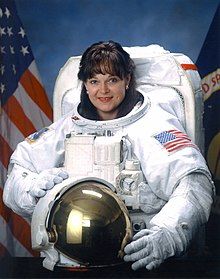Tamara E. Jernigan
Tammy Jernigan | |
|---|---|
 Jernigan, c. 1999 | |
| Born | Tamara Elizabeth Jernigan May 7, 1959 Chattanooga, Tennessee, U.S. |
| Education | Stanford University (BS, MS) University of California, Berkeley (MS) Rice University (PhD) |
| Space career | |
| NASA astronaut | |
Time in space | 63d 1h 24m |
| Selection | NASA Group 11 (1985) |
Total EVAs | 1 |
Total EVA time | 7h 55m |
| Missions | STS-40 STS-52 STS-67 STS-80 STS-96 |
Mission insignia | |
| Retirement | 2001 |
Tamara Elizabeth "Tammy" Jernigan (born May 7, 1959) is an American astrophysicist and former NASA astronaut. During her career she completed five Space Shuttle program missions (three on Columbia and one each on Endeavour and Discovery), logging over 1512 hours in space. Jernigan left NASA in 2001, and is Deputy Principal Associate Director in the Weapons and Complex Integration (WCI) organization at Lawrence Livermore National Laboratory.
Early life and education
[edit]Tamara Elizabeth Jernigan was born on May 7, 1959, in Chattanooga, Tennessee, to Mary and Terry Jernigan.[1] She attended Santa Fe High School in Santa Fe Springs, California, graduating in 1977. Jernigan attended Stanford University, where she played varsity volleyball. She earned a B.S. degree in physics in 1981 and an M.S. in engineering science in 1983. At the University of California, Berkeley, she received an M.S. in astronomy in 1985. In 1988, she was awarded a Ph.D. in space physics and astronomy from Rice University. Her research focused on the modeling of high-velocity outflows in regions of star formation, gamma-ray bursters, and the study of radiation produced by interstellar shock waves.[2]
NASA career
[edit]Jernigan began working for NASA in June 1981 at the Ames Research Center while earning her degrees at Stanford and Berkeley. She worked in the Theoretical Studies Branch as a research scientist until June 1985 when she was among the 13 people selected as astronaut candidates.[3]

She entered the NASA Astronaut Corps in July 1986. Her first trip to space was on June 5, 1991.[4] She flew on five Space Shuttle program missions (three on Columbia[5][6][7] and one each on Endeavour[8] and Discovery[9]) and logged over 1512 hours in space. In her last mission on Discovery in 1999, she performed an extra-vehicular activity for 7 hours and 55.5 minutes.[10]
Jernigan has served as Deputy Chief of the Astronaut Office, assisting with the management of both military and civilian astronauts and support personnel and as Deputy for the Space Station program where she developed and advocated Astronaut Office positions on the design and operation of the International Space Station. She also represented NASA management on the U.S. negotiating team in Moscow during technical interchange meetings designed to resolve crew training, crew rotation, and operational issues.[2]
Jernigan retired from NASA in 2001 and currently serves as Deputy Principal Associate Director in the Weapons and Complex Integration (WCI) organization at Lawrence Livermore National Laboratory.[1]
Awards
[edit]Jernigan is the recipient of the NASA Distinguished Service Medal and the NASA Outstanding Leadership Medal.[2]
Personal
[edit]She currently resides in Pleasanton, California. She is married to former astronaut Peter Wisoff and has two children, Jeffrey Wisoff and Michael Wisoff. Both Peter and Jeffrey currently work at the Lawrence Livermore National Laboratory.
References
[edit]- ^ a b "Biographical Data: Tamara E. "Tammy" Jernigan (Ph.D.)" (PDF). National Aeronautics and Space Administration. November 2001. Retrieved July 27, 2020.
- ^ a b c "Report of the Assessment Committee for the National Space Weather Program" (PDF). Office of the Federal Coordinator for Meteorological Services and Supporting Research (OFCM). June 2006. Retrieved January 16, 2019.
 This article incorporates text from this source, which is in the public domain.
This article incorporates text from this source, which is in the public domain.
- ^ "Women in Aviation and Space History: Tamara Jernigan". Smithsonian National Air and Space Museum. Retrieved January 15, 2019.
- ^ Space sciences (2nd ed.). Detroit, Mich.: Gale (Firm), Cengage Learning. 2012. ISBN 9780028662190. OCLC 781937044.
- ^ Ryba, Jeanne (February 18, 2010). "STS-40". Mission Archives. NASA. Archived from the original on May 6, 2021. Retrieved May 6, 2021.
- ^ Ryba, Jeanne (March 31, 2010). "STS-52". Mission Archives. NASA. Archived from the original on May 6, 2021. Retrieved May 6, 2021.
- ^ Ryba, Jeanne (November 23, 2007). "STS-80". Mission Archives. NASA. Archived from the original on May 6, 2021. Retrieved May 6, 2021.
- ^ Ryba, Jeanne (April 1, 2010). "STS-67". Mission Archives. NASA. Archived from the original on May 6, 2021. Retrieved May 6, 2021.
- ^ Ryba, Jeanne (November 23, 2007). "STS-96". Mission Archives. NASA. Archived from the original on May 6, 2021. Retrieved May 6, 2021.
- ^ "Astronaut Bio: T. Jernigan 11/2001". www.jsc.nasa.gov. February 11, 2015.
External links
[edit]
- 1959 births
- Living people
- Lawrence Livermore National Laboratory staff
- NASA astrophysicists
- NASA civilian astronauts
- Scientists from Tennessee
- Rice University alumni
- Space Shuttle program astronauts
- Stanford University alumni
- University of California, Berkeley alumni
- American women astronauts
- American women astrophysicists
- American astrophysicists
- Spacewalkers
- Santa Fe High School (California) alumni
- American scientist stubs
- Astronaut stubs
